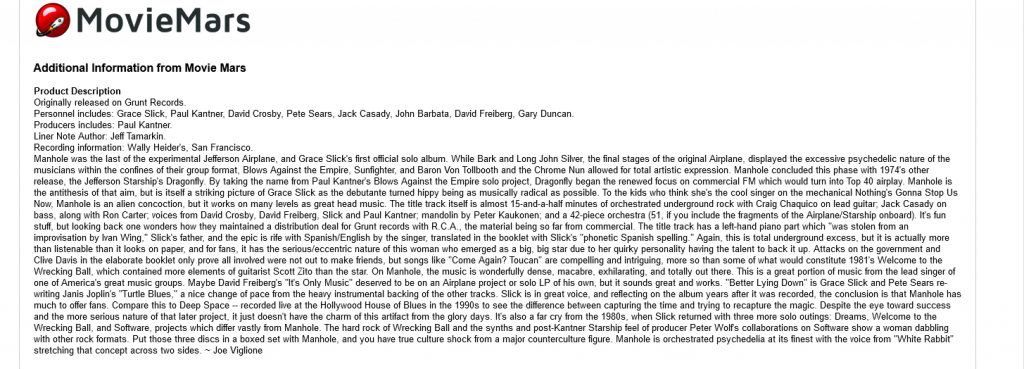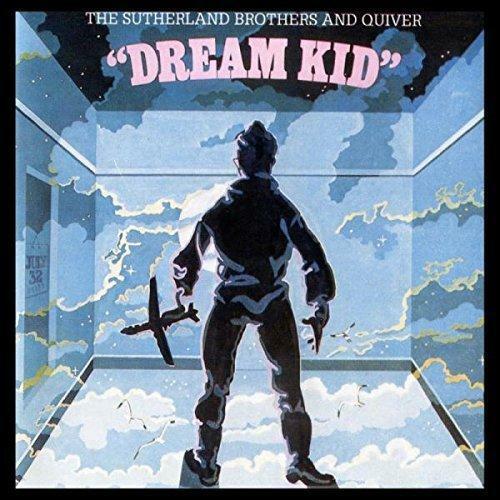
I promise you the plethora of record albums on this site day after day after day are purely from the subconscious. It wasn’t my intent to have pages and pages of vinyl LP reviews, they just started proliferating again; that’s just a big part of my life so here it is:

You might say “this guy’s totally insane” but I did get a good deal for about $6.50 tonight for a bunch more vinyl – Petula Clark, Bette Midler, Olivia Newton John, Al Martino (with some interesting liner notes,) too good to pass up….excuse me as I mix drinks….my icewater and Cranberry juice at 1:08 am…
…Not only do I OWN vinyl records, I review them as well! Found my old Manhole CD/LP review (I reviewed it off the vinyl all those years ago) …so many eBay dealers using my thoughts on the music!
Product Description
Originally released on Grunt Records.
Personnel includes: Grace Slick, Paul Kantner, David Crosby, Pete Sears, Jack Casady, John Barbata, David Freiberg, Gary Duncan.
Producers includes: Paul Kantner.
Liner Note Author: Jeff Tamarkin.
Recording information: Wally Heider’s, San Francisco.
Manhole
was the last of the experimental Jefferson Airplane, and Grace Slick’s
first official solo album. While Bark and Long John Silver, the final
stages of the original Airplane, displayed the excessive psychedelic
nature of the musicians within the confines of their group format, Blows
Against the Empire, Sunfighter, and Baron Von Tollbooth and the Chrome
Nun allowed for total artistic expression. Manhole concluded this phase
with 1974’s other release, the Jefferson Starship’s Dragonfly. By taking
the name from Paul Kantner’s Blows Against the Empire solo project,
Dragonfly began the renewed focus on commercial FM which would turn into
Top 40 airplay. Manhole is the antithesis of that aim, but is itself a
striking picture of Grace Slick as the debutante turned hippy being as
musically radical as possible. To the kids who think she’s the cool
singer on the mechanical Nothing’s Gonna Stop Us Now, Manhole is an
alien concoction, but it works on many levels as great head music. The
title track itself is almost 15-and-a-half minutes of orchestrated
underground rock with Craig Chaquico on lead guitar; Jack Casady on
bass, along with Ron Carter; voices from David Crosby, David Freiberg,
Slick and Paul Kantner; mandolin by Peter Kaukonen; and a 42-piece
orchestra (51, if you include the fragments of the Airplane/Starship
onboard). It’s fun stuff, but looking back one wonders how they
maintained a distribution deal for Grunt records with R.C.A., the
material being so far from commercial. The title track has a left-hand
piano part which “was stolen from an improvisation by Ivan Wing,”
Slick’s father, and the epic is rife with Spanish/English by the singer,
translated in the booklet with Slick’s “phonetic Spanish spelling.”
Again, this is total underground excess, but it is actually more than
listenable than it looks on paper, and for fans, it has the
serious/eccentric nature of this woman who emerged as a big, big star
due to her quirky personality having the talent to back it up. Attacks
on the government and Clive Davis in the elaborate booklet only prove
all involved were not out to make friends, but songs like “Come Again?
Toucan” are compelling and intriguing, more so than some of what would
constitute 1981’s Welcome to the Wrecking Ball, which contained more
elements of guitarist Scott Zito than the star. On Manhole, the music is
wonderfully dense, macabre, exhilarating, and totally out there. This
is a great portion of music from the lead singer of one of America’s
great music groups. Maybe David Freiberg’s “It’s Only Music” deserved to
be on an Airplane project or solo LP of his own, but it sounds great
and works. “Better Lying Down” is Grace Slick and Pete Sears re-writing
Janis Joplin’s “Turtle Blues,” a nice change of pace from the heavy
instrumental backing of the other tracks. Slick is in great voice, and
reflecting on the album years after it was recorded, the conclusion is
that Manhole has much to offer fans. Compare this to Deep Space —
recorded live at the Hollywood House of Blues in the 1990s to see the
difference between capturing the time and trying to recapture the magic.
Despite the eye toward success and the more serious nature of that
later project, it just doesn’t have the charm of this artifact from the
glory days. It’s also a far cry from the 1980s, when Slick returned with
three more solo outings: Dreams, Welcome to the Wrecking Ball, and
Software, projects which differ vastly from Manhole. The hard rock of
Wrecking Ball and the synths and post-Kantner Starship feel of producer
Peter Wolf’s collaborations on Software show a woman dabbling with other
rock formats. Put those three discs in a boxed set with Manhole, and
you have true culture shock from a major counterculture figure. Manhole
is orchestrated psychedelia at its finest with the voice from “White
Rabbit” stretching that concept across two sides. ~ Joe Viglione



Title
The Sutherland Brothers And Quiver – Dream Kid
Track Listing
1. You and Me
2. I Hear Thunder
3. Flying Down To Rio
4. Seagull/Lonely Love
5. Champian the Underdog
6. Bluesy World
7. Bad Loser
8. Dream Kid
9. Maker
10. Rollin’ Away/Rocky Road/Saved By the Angel
Bonus Tracks
11. Silver Sister
12. Don’t Mess Up
Details
Number of CDs: 1
Recording Type: Studio
EAN: 5028479022823
Album Notes
An artists conception of The Dream Kid looking out into a blue universe, standing in a clear cube with clouds and seagulls in his line of sight, is a colorful and good visual equivalent to the music inside this team-up of two musical forces. Songwriters Ian Sutherland and his brother Gavin Sutherland recruit three members of the Warner Bros. group Quiver — drummer Willie Wilson, guitarist Tim Renwick, and bassist Bruce Thomas — and come up with a smooth and very satisfying product. Gone is Quiver songwriter vocalist Cal Batchelor, and it is a unique transition concept. Where Chris Thomas produced 1972’s Gone in the Morning album for Quiver, Muff Winwood is enlisted to guide the rhythm section and guitarist behind the singing and playing Sutherland Brothers. Interestingly enough, they’ve retained Quiver engineer Bill Price and cover artist Barney Bubbles from the Warner Bros. days and issue the newer sounds on Island. The album’s history lesson aside, the music is an excellent early- to mid-’70s hybrid of folk-rock and pop, with more emphasis on the clever pop side of things. This is Eric Carmen’s Raspberries gone underground with less of the jangle guitar — sounds more borrowed from early Beatles’ hits by way of latter day Traffic, and that comfortable silky vocal sound, especially on the five-minute-55-second suite which ends the album, track ten, comprised of three titles, “Rollin’ Away,” “Rocky Road,” and “Saved By the Angel.” These Ian Sutherland titles all melt into one another and are easy on the ears, good listening music, though there is nothing on this album as extraordinary as their minor hit “You Got Me Anyway” or the song Rod Stewart picked up from them, “Sailing.” Like labelmates Traffic, this is an adult rock endeavor, meant for those who want to hear the lyrics as they take in the solid melodies. “Seagull” is a song that embodies what the band is all about, ebbing and flowing with hooks and pauses, not your typical rock outfit, which might explain why they slipped through the cracks without making a bigger noise. Peter Noone, like Stewart, was smart enough to cover their music, and it is a pity that “Flying Down to Rio” and “You and Me” didn’t get more time on FM radio. “I Hear Thunder” and “Lonely Love” are standouts, precursors to AAA radio like Barclay James Harvest and Matthew’s Southern Comfort. The strong lyrics are included on the album sleeve, and enough good things can’t be said about this album: bouncy guitars and spirited rock which producer Muff Winwood squeezes into the grooves. You’ve got to spin it three or four times before it catches you; it’s one of those special discs that doesn’t grab the listener first time around, but when it does, it gets you good. ~ Joe Viglione
